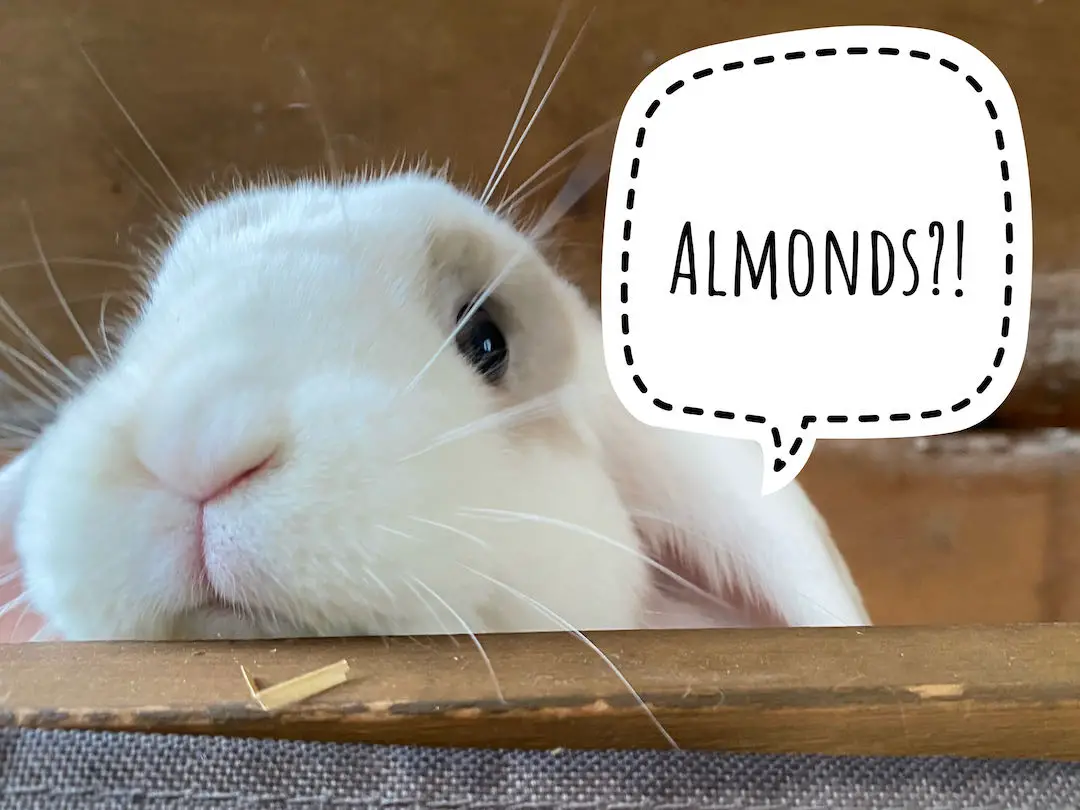Many of us love to munch away on almonds as a healthy snack. These nuts are jam-packed with nutrients, including the good kind of unsaturated fats. And they’re tasty – what’s not to like? But what about our pet rabbits – can we give almonds to rabbits, how healthy are almonds for bunnies, and should we worry if our bunny does eat an almond?
Can rabbits eat almonds – summary
You should not feed almonds to rabbits. While almonds are not toxic to bunnies, they provide the wrong balance of nutrients for rabbits. Almonds are extremely high in fats. Eating too many almonds may cause stomach problems including GI stasis for rabbits, which need low fat and high fibre diets based on hay.
Why almonds are bad for rabbits
Almonds may be good for humans, but they’re not so good for rabbits. This table gives the nutrition inside almonds, and compares it to what rabbits need.
| Ingredient | Almonds per 100g | Rabbit daily nutritional requirements per 100g of feed | Comments |
|---|---|---|---|
| Energy | 579 kcal | Almonds are high in calories. Just like humans, rabbits need to watch their weight. | |
| Protein | 21.2 g | 12-17 g | Almonds are high in proteins. You might think that this is a good thing, but the higher concentration of proteins in the rabbit gut could cause problems, upsetting the balance of bacteria inside the rabbit intestinal system. |
| Fat | 49.9 g | 2.5-5 g | Almonds are much too high in fat for rabbits. This can create short term problems in the gut, and longer term issues over rabbits becoming overweight. |
| Fibre | 12.5 g | 14-25 g | Rabbits need a lot of fibre in their diets to keep food moving through their digestive system. Without fibre, it all blocks up and creates problems. Almonds aren’t too bad in this regard, though still not providing the amount of fibre that rabbits require. |
| Carbohydrates | 21.6 g | < 20 g | Rabbits need a relatively low carbohydrate diet. Almonds are high in carbohydrates. |
| Calcium | 269 mg | 500 mg | Almonds contain calcium. Rabbits need a low calcium diet, as they are prone to developing extremely painful kidney stones. |
| Iron | 3.71 mg | 30-400 mg | Almonds only provide a little of the iron that rabbits need in their diets. |
| Phosphorus | 481 mg | 400 mg | Almonds are slightly higher in phosphorus for a healthy rabbit diet. |
| Potassium | 733 mg | 6,000 mg | Almonds can contribute to the potassium that rabbits need each day. |
| Vitamin A | None | 1,000-1,200 IU | Almonds provide none of the vitamin A that rabbits need. |
| Vitamin C | None | None | Almonds don’t contain vitamin C, and rabbits don’t need any (their bodies make vitamin C). |
| Vitamin E | 25.6 mg | 5-16 mg | Almonds provide a little too much vitamin E for rabbits. |
| Vitamin D | None | 80-100 IU | Almonds provide none of the vitamin D that rabbits need. |
| Vitamin B complex | 58 mg | None | Rabbits don’t need vitamin B complex. Their bodies make all that they need. |
| Zinc | 3.12 mg | 5-15 mg | Almonds are OK on the amount of zinc. |
| Selenium | 0.004 mg | 0.005-0.032 mg | Almonds are OK on the amount of selenium that rabbits need. |
As you can see from the table, the main problem with almonds is that they are so high in fats (almost 50% fat). Rabbits have evolved to live off vegetation, including grass, which is high in fibre and with little or no fat. In the wild, rabbits rarely get to eat nuts, so their digestive system is not geared up for them.
If rabbits have too many almonds, their digestive system has to cope with much more fat than it is designed for. Part of the digestive system is the caecum, which digests the fibre. If too much fat is in the caecum, it can encourage the growth of unhealthy bacteria. In turn, this causes problems with gas and diarrhoea.
While indigestion is usually just inconvenient to us, it is far more dangerous to rabbits. The rabbit digestive system needs to keep food moving, helped by all the fibre in their usual diet. If a rabbit does develop stomach problems, this can become GI stasis (gastro-intestinal stasis). The rabbit may become constipated, and stop feeding.
If you suspect that your bunny has GI stasis, consult a vet straight away, as it can prove fatal for rabbits.
Another problem with almonds is their high calorie count. Each little nut packs quite a big energy punch. Eating high calorie food like almonds on a regular basis could easily lead to your bunny being overweight. This in turn can cause other health problems for your rabbit.
Almonds aren’t toxic to rabbits. They are not poisonous. But they are unhealthy, and best avoided as a snack.
Help! My bunny ate some almonds – what should I do?
If your bunny just found one or two almonds on the floor – don’t worry. They have effectively had an unhealthy snack. If they usually have a good diet, your rabbit should have no problems.
If your rabbit has eaten lots of almonds, make sure to keep a careful eye on them over the next 12 to 24 hours. Check that they are poo-ing and eating as usual. If you have any concerns at all, consult a vet straight away.
What diet should rabbits have?
Rabbits should have a diet that is based mainly on hay and fresh water. These provide practically all that rabbits need nutritionally. Basically, you can’t give your rabbit too much hay. You can supplement hay (preferably Timothy hay) with an egg-cupful of rabbit nuggets and a handful of fresh greens each day. You can also give a small snack like a slice of fruit.
Conclusion
Rabbits should not be given almonds. Although not toxic to rabbits, almonds are extremely high in fats, which could upset the rabbit digestive system if eaten in sufficient quantities. Rabbits should eat mainly hay, and if you want to give your bunny a snack, a slice of fruit is a better alternative.
Check out these other posts
Find out more about rabbit nutrition here.
The Rabbit Digestive SystemThis post goes into more detail on the rabbit digestive system.
Fruit is a better snack than nuts. Check out which fruit and how much to give your bunny.


